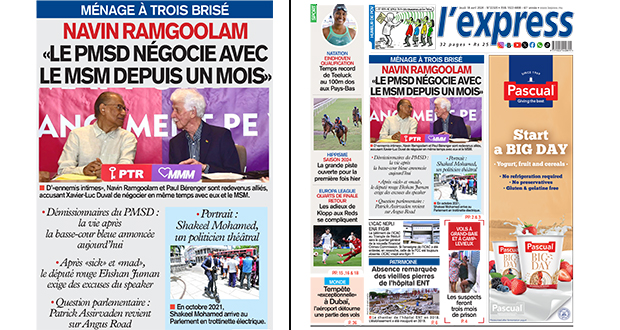Publicité
Planning a pharma future for Mauritius is necessary and achievable
Par
Partager cet article
Planning a pharma future for Mauritius is necessary and achievable

Over the past few weeks, there has been a lot of discussion about the various obstacles facing the pharmaceutical industry in Mauritius. Product shortages, supply-chain issues, concerns about generic versus branded medications and more have led us once again to consider the idea put forward by the government of creating a pharmaceutical manufacturing sector here in Mauritius. While I believe Mauritius can manufacture some pharmaceutical products in due course, there are some critical steps to be followed before any significant industry is developed.
The proposed long-term solution of establishing a pharmaceutical manufacturing industry here in Mauritius is a topic I am very familiar with. Having had the opportunity to research this extensively through a research paper prepared by IBL Life, CIDP and us at Aspen Global Incorporated, and supported by the Economic Development Bank back in 2019, I wanted to share a few thoughts on the subjects at hand.
Let us start with the most obvious and frustrating subject for everyone – the lack of available medicines. The first thing to note is that Mauritius is not alone in this struggle. Large countries with significantly more purchasing power, such as Australia and Germany, have been facing shortages in a variety of medications for different reasons over the past weeks and months. In the case of Mauritius and aside from our small size and low purchasing power, I see two main reasons: global supply chain interruptions and our reliance on products manufactured abroad.
These supply chain interruptions are due to a perfect storm starting with COVID-19, followed by the Russia-Ukraine war resulting in skyrocketing prices of gas. These factors contributed to very high costs of air shipments, which caused many companies to switch to sea freight resulting in longer lead times which meant delays in getting to the end user, the patient. The solution to this issue is to buy more stock of the items that have a long shelf-life so that there is less need to order often, and less chance of running into delays later on. This would mean higher working capital for pharmacies and wholesalers. While the upside consists of having more availability in case of a surge in demand, the downside means losing the more cost-efficient approach of having minimum stock.
This leads us to the second issue of dependency on medications from abroad and the subject of generic versus branded medications. At Aspen, we have both branded and generic medications and understand the nuance very well. Generics are as effective as the branded medicines as they have the same API. API is the Active Pharmaceutical Ingredient, the part of the medicine that is effective – “the real medicine”, the rest being mere additives to ensure that the API can be delivered in the form it is delivered. The first caution to keep in mind when using a generic is that while the API responsible for the safety and effectiveness of the drug is the same, the other ingredients may be different from branded to generic. In extremely rare cases, a patient may be allergic or react differently to those other ingredients. However, I must point out that this particular issue is negligible. The other caution is related to specific drugs with narrow therapeutic index, meaning that a small change in dosage can lead to serious reactions or lesser efficacy.
While these are, in my opinion, the two main exogenous factors impacting the current pharmaceutical market, there remains a crucial endogenous variable for the industry’s development which is the proper understanding of responsibility over Quality. There is a reason why the Pharmaceutical Industry is amongst the most strictly regulated worldwide: this is because the Pharmaceutical Quality affects every patient undergoing drug administration, and a sub-optimal quality can potentially be life-threatening. Regulators from the FDA in the US to the European Medicines Agency (EMA) are therefore extremely stringent when it comes to the enforcement of mandatory rules and the compliance of the pharmaceutical manufacturing industry to the reference guidelines. These guidelines, known as CGMP, which refers to the Current Good Manufacturing Practice regulations enforced by regulators worldwide, provide for systems that assure proper design, monitoring and control of manufacturing processes and facilities. Adherence to the CGMP regulations thus assures the identity, strength, quality, and purity of drug products by enforcing the manufacturers of medications to adequately control production operations. This includes establishing strong quality management systems, obtaining appropriate quality raw materials, applying robust operating procedures, detecting and investigating product quality deviations, as well as maintaining reliable testing laboratories. Such quality guardrails are essential when the authorities are accountable for the certification of pharma manufacturing facilities. Currently, Mauritius is able to rely on the certifications by the authorities in the exporting countries and does not require the same skills as manufacturing countries and institutions.
To drive a long-term development of the sector and start producing pharmaceuticals locally, it is thus critical to frame the local regulatory environment in a way that it is aligned with international practices and recognized standards. The Pharmaceutical Inspection Co-operation Scheme (PIC/S) provides a step-up procedure to enroll an authority willing to achieve the CGMP recognition status. Membership in PIC/S ensures mutual recognition between member countries for certifications provided by the competent authority and removes trade barriers while assuring harmonized quality standards and interpretation of guidelines. PIC/S GMP are recognized globally especially in the non-EU/US world. PIC/S facilitates cooperation and networking amongst competent authorities (through expert circles) for training, assessment (and reassessments) of inspectorates. Before a Regulatory Authority is accepted for PIC/S membership, a detailed assessment (gap analysis) is undertaken to determine whether the authority has the structure and competence necessary to apply an inspection system which is equivalent to that of current PIC/S Participating Authorities.
Once the sector is established, we will have to acknowledge that Mauritius will never be fully self-sufficient when it comes to medications. Anyone claiming that the establishment of local pharma will completely prevent medicine shortages is mistaken. We will, however, be in a position to benefit from a barter economy where we could produce what other markets need and conduct exchanges in times of difficulty. It is important here to note that the pharmaceutical sector is similar to other sectors where relationships are key. Establishing a healthy pharma sector will enable such relationships to be utilized when the next pandemic hits. We can also learn from the likes of Airbnb and Uber– they did not need to own property or cars to be effective in the domains in which they operate. Mauritius can also elect a similar model whereby the country buys “capacity allocation” at certain sites abroad that can manufacture what Mauritius needs, like diabetes medications, vaccines, and cardiovascular products. This model will ensure access to medicines beyond the 1 or 2 categories that Mauritius will set up.
Throughout all stages of its development, the Mauritian pharma industry will require specialized skills that are currently and unfortunately not fully catered for in the local education system. The insufficient number of pharmacists in Mauritius right now is the tip of the iceberg when it comes to staffing the pharma industry. I like to think of Aspen Global as a case study: through significant investment and over more than 14 years in training local talent and repatriation, we have been able to grow a pool of specialized skills large enough to operate a business that caters to 150 countries with all the complexity that is inherent in a global business, especially pharma. There is no doubt that if we want to establish local pharma, we must enhance collaboration with universities today. I believe so strongly in this aspect of industry development that I am making an open invitation to assisting any university in Mauritius interested in Pharmaceuticals to model their educational programs. It serves us, it serves the country, and it serves my personal goal of enhancing the communities in which Aspen Global operates.
I’ll finish with a quote from a great book, The Alchemist: “when you want something, all the universe conspires in helping you to achieve it.”
Publicité
Les plus récents






